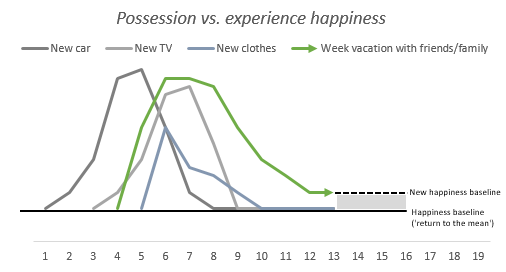MINIMALISM LIFESTYLE
Let’s face it, we live in a world of surfeit stuff, where possession of things can become overwhelming and even oppressing. Big-boxes stores and 24-hour online shopping opportunities with always have some discount that can be applied to possess something new. It can become very easy to have things we consume, consume us. There isn't any indication that any of these things make anyone any happier, in fact the opposite may be true.
Psychological research suggests that, in the long run, experiences make people happier than possessions of material things and that's in part because the initial joy of acquiring a new object, such as a new car, fades over time as people become accustomed to seeing it every day. Experiences, on the other hand, continue to provide happiness through memories long after the event occurred. Most psychologists who study the phenomenon say people adapt to a new purchase in six to eight weeks, up to a maximum of three months. That means the initial pleasure we get from a new possession generally fades in a matter of months.
In the graph below I try to sketch out how happiness from possession versus 'human' interaction or personal experience can differ in the long-term. The idea is that when you buy something new, let's say a new TV, you generate a sense of happiness for this new toy but you realize (or not) rather quickly that the level of happiness that you first had when you first purchased that item does not remain constant and eventually goes back to your past 'happiness baseline', you can call that 'return to the mean'. Inversely, when you experience something such as human bondage or inner experience by trying something new (week vacation in this case), you can argue that the level of your happiness baseline reaches a new ‘constant’ level. In other word, by looking for these experiences / ‘feel’ instead of ‘want/haves’, you can alter your overall happiness state in the long-term.

Minimalism joins the idea of experiences over possession. Is it a need or rather a want? This is the key question to think of. Do you need that new iPhone when yours works fine, or is it just because you want it? With this society and our rather relatively high disposable income, it is easy to fall into that trap of “oh! That’s looks cool, let’s get it” rather than “that’s cool, but let’s be serious, I’ll never really use it or wear it so I’m going to consciously resist the temptation to purchase it.”
A man should always seek to be in control of the things he owns, not the other way around. Real manliness means freedom from the bondage of material goods because we know that, intuitively, the best stuff in life isn't stuff at all, and that relationships, experiences and meaningful work are the staple of a happy life. There are some serious benefits of owning less: first, you spend less which gives you more financial freedom; you lessen your stress by having fewer things at home which naturally becomes much easier to clean; you find things more easily and you can even display what you value most.
Sustaining a minimalist lifestyle can be very beneficial for one man’s life. If you can constantly question your possessions, keep yourself from owning excess stuff and avoid giving meaning to them, you will be ahead of the game by allowing yourself to focus on the most important parts of life: health, relationships, passions, growth, and contribution.
@jurisnaturalist great post and i've just upvoted it... material like cars houses and watches don't bring happiness.
I've followed you and hope you follow back, I'm trying to spread the word about simple health tips to beat any disease :)
Keep posting!!
Thanks @stevehodder. I'm following you now!